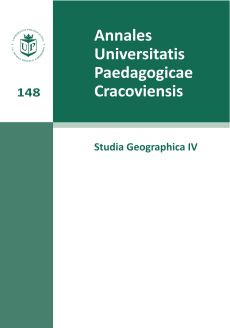Dokształcanie i doskonalenie zawodowe nauczycieli geografii… jako instrument dostosowania się do aktualnych wyzwań rynku pracy
Słowa kluczowe:
studia nauczycielskie z geografii, oferta edukacyjna, rynek pracy, dokształcanie zawodoweAbstrakt
Facing a deteriorating situation on the job market for teachers (including geographers), one should expect even heavier commitment of the professional group to their additional training. Therefore, it is necessary to take actions on the central level for creating wider range of offer adequate for the teachers’ needs and supporting them in that. The current system of methodological guidance and additional training for teachers is based on local arrangements and diverse organizational and financial models. There are no universal and clear factual criteria for selection of methodological advisers who would come to geography teachers’ aid, especially to those just starting their career. Methodological advisers should have an opportunity to more widely cooperate with local geography didactics sections and with Geographical Education Commission of the Polish Geography Society. Due to that, the need for introducing more frequent subject training courses for methodological advisers occurs. They are to be organized not only by publishing houses but by universities and geographical organizations as well (Groenwald et al., 2008). The collected material allows forming a statement that geography teachers in the Lesser Poland Voivodship have access to a wide range of additional training offers, mainly short coursers. Diagnostic research proved that geographers are would take the opportunity to participate in courses enabling them to acquire qualifications for teaching other subjects. The variety of forms and thematic areas of extra training activities undertaken by the teachers, can be seen as a confirmation of their great ambitions, aspirations and strive for professional perfection. Such an involvement is certainly caused, at least to some extent, by a critical position of geography as a school subject and a real risk of losing the job when a teacher holds qualifications for teaching only one school subject. Therefore, there is a special need for new competencies that a teacher should acquire. Among them, the most frequently mentioned are the following skills: working in a multicultural and diverse group, co-operating with people from the local environment, introducing information-communication technologies into pupils’ everyday life, forming pupils’ civil and social awareness, and functioning in the society (Sielatycki, 2008). In the light of the research, one should state that recent intense involvement of geography teachers in forms of additional training, especially those enabling acquiring qualifications for teaching other school subjects, seems to be unavoidable and to be the most effective way of adapting to various challenges on the educational job market.
Bibliografia
Brudnik, E., Owczarska, B. (2000). Formy i modele wewnątrzszkolnego doskonalenia nauczycieli. Warszawa: Wyd. CODN.
Groenwald, M., Plit, F., Rodzoś, J., Szkurłat, E., Tracz, M. (2008). Raport o stanie geografii szkolnej w nowym systemie oświaty w Polsce. Dokumentacja Geograficzna, 38, 5–17.
Kołodziejczyk, W., Polak, M. (2011). Jak będzie zmieniać się edukacja? Wyzwania dla polskiej szkoły i ucznia. Warszawa: Instytut Obywatelski.
Osuch, W. (2010). Kompetencje przedmiotowe i dydaktyczne nauczycieli geografii oraz studentów geografii-kandydatów na nauczycieli. Kraków, Wyd. Naukowe UP.
Pilch, T. (red.). (2003). Encyklopedia pedagogiczna XXI wieku. Warszawa: Wydawnictwo Akademickie „Żak”.
Piróg, D. (2012). Poziom zainteresowania pracą w zawodzie nauczyciela wśród studentów geografii. Prace Komisji Edukacji Geograficznej PTG, 2, 194–210.
Rozporządzenie Ministra Edukacji Narodowej z dn.19 listopada 2009 r. w sprawie placówek doskonalenia nauczycieli (Dz. U. 2009, Nr 200, poz. 1537).
Sielatycki, M. (2008). Kompetencje nauczyciela w Unii Europejskiej. W: K. Sujak-Lesz (red.), Kształcenie nauczycieli w szkole wyższej. Wybrane zagadnienia. Wrocław: Oficyna Wydawnicza Atut, 13–21.
Strony internetowe placówek doskonalenia nauczycieli [dostęp 03.11.2012]
http://www.gce.krakow.pl/galicyjski-osrodek-doskonalenia-nauczyciel /14,1,15,o-godn.html
www.kangur.edu.pl/mnodn
www.mncsz.pl/kursy.html
www.pocieszka.pl/index.php?page=szkolenia_odn&menu=odn& item=szkol_odn
www.grawena.edu.pl/oferta-szkolen.html
www.semeks.com.pl/menos,s-4.html
www.mensana.pl/
www.janpawel2.pl/doskonalenie-nauczycieli
www.pspp.pl
www.sps.org.pl/s77_dla_nauczycieli.htmlibc.edu.pl/node/275
www.homohomini.org/index.php?page=8470kire.pl/old/
www.malopolska.edu.pl/oferta_edukacyjna/dla_nauczyciela/tozch.edu.pl/idnik/index.php?okno=oferta_edukacyjna_szkolenia#placowki_oswiatowe
www.pcegorlice.pl/pl/40628/0/Doskonalenie.html
www.ikn.org.pl/
www.nauczyciele.bncdn.pl/
www.nce.malopolska.pl/index.php?option=com_content&task=view&id=12&Itemid=12
www.sce.pl
Pobrania
Opublikowane
Numer
Dział
Licencja
Złożenie artykułu do druku oznacza wyrażenie zgody na bezpłatne (tj. bez honorariów autorskich) przeniesienie autorskich praw majątkowych na Wydawcę i zezwolenie na wydanie pracy w postaci drukowanej w dowolnej liczbie egzemplarzy oraz zamieszczenie jej w postaci otwartego dostępu na stronie internetowej czasopisma, w bibliotekach cyfrowych oraz innych cyfrowych platformach wydawniczych, z którymi Wydawca zawarł lub zawrze stosowne porozumienie o udostępnianiu. W przypadku artykułów wieloautorskich przyjmuje się, że autor zgłaszający pracę („correspondingauthor”) ma pełnomocnictwo do reprezentowania pozostałych współautorów w tym zakresie. Autorzy są proszeni o podpisanie stosownego oświadczenia w tej sprawie.

